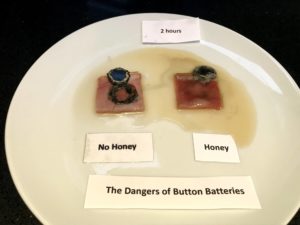You can find button batteries or lithium coin cell batteries in many devices. Many devices used by your children contain these batteries and if swallowed, they can be incredibly dangerous. Sometimes button batteries pass straight through without causing harm. However, if a battery, particularly a lithium coin one gets stuck in the oesophagus or gut it can lead to serious problems.
Ambulance service now advising to administer honey
The ambulance service are now advising people to give 2 teaspoonsful of honey to children over the age of 12 months, if they are thought to have swallowed a button battery. They should give this every 10 minutes, up to a maximum of 6 doses. They should do this, providing it is immediately available, the child is able to swallow, and it is less than 12 hours since ingestion. Do not give if the child is under 12 months or if they are known to be allergic to honey. Get your child to hospital as soon as possible, do not delay transporting them there.
This article outlines the safety precautions you should take to avoid your child swallowing a battery and what to do if they do.
Burns
Burns from button batteries are not usually due to chemicals leaking from the battery but because the battery itself reacts with bodily fluids, such as mucus or saliva. This reaction releases a substance like caustic soda, which is a strong alkali (as dangerous as a strong alkali) that burns through flesh. This is similar to the substance used to unblock drains!
Even ‘dead’ batteries can cause damage so should be treated just as carefully as new batteries. The burns from the caustic soda can lead to catastrophic internal bleeding and death. The reaction can happen in as little as two hours. If a button battery gets stuck in a child’s nose or ear it can cause serious damage.
How many children are affected?
At least two children die every year from from swallowing batteries. There is an ongoing study to establish exactly how many children present at A&E having swallowed batteries as we don’t currently have this data. They will also look at the numbers of children who have had surgery and experienced life-changing injuries from them too.
It is suspected that the number of children affected is likely to be similar to that in Australia. There 4 children a week require hospital treatment following battery ingestion.
Children ingest button batteries more than 2,500 times a year in the United States. There has been more than a 12-fold increase in fatal outcomes in the last decade compared to the prior decade.
How little ones get hold of batteries:
There are many ways that these accidents happen. Some of the most likely ways that children get hold of batteries is as follows:
- You drop the device and the battery falls out.
- Leaving a ‘flat’ battery on a worktop, table or somewhere accessible to children.
- An open pack of batteries spills out and rolls under furniture.
- Storing spare batteries in an easy-to-reach drawer in the lounge or kitchen.
- The button battery compartment of a toy or other device isn’t secure.
- Remain vigilant in your home, when visiting friends and family and when out and about, at play areas and in shops.
Take 10 minutes to check all the areas where button batteries could be accessible to your children!
Button batteries are used in so many devices – from toys, medical devices such as thermometers, calculators and scales, singing cards, key fobs, remote controls and many other devices.
In the UK, batteries in children’s toys are covered by toy safety regulations. They should either be enclosed by a screw and a secure compartment or require two independent or simultaneous movements to open the battery compartment.
These regulations do not apply to other gadgets requiring batteries. Even if they compartments are secured, a persistent and dexterous childcan still open them.
How to Keep Your Child Safe:
- Look round your home and check for lithium coin cell batteries – in products as well as spare and ‘flat’ batteries.
- Keep all spare batteries in a sealed container in a high cupboard.
- Keep products well out of children’s reach if the battery compartment isn’t secure.
- Make a point of checking battery compartments to ensure they remain secure, every time you use a device.
- Taping the secured battery compartment can add a further deterrent to make it even harder for children to access the batteries.
- ‘flat’ or ‘dead’ batteries should be taken out of children’s reach straight away and recycled safely and as quickly as possible. Most supermarkets offer battery recycling.
- Avoid toys from markets and discount stores as they may not conform to UK safety regulations and be extremely careful when buying online or from overseas. Always look for the CE safety mark.
- Teach older children that button batteries are dangerous and never to play with them or give them to younger children.
- Choose quality batteries that have double secure packaging and ideally find ones that have a Bitrex coating. Bitrex is a product so sour that children will not want to put them in their mouth and will spit them out immediately.
- Share information and spread the word about how dangerous batteries can be if swallowed or inserted into an ear or nose. Help prevent further children from serious damage or dying.
What to do if you suspect your child may have swallowed a battery
- If you suspect your child has swallowed a button battery, take them to your nearest Accident and Emergency (A&E) department as quickly as possible.
- Do not delay getting to hospital.
- A recent study in Philadelphia has shown that feeding your child 2 teaspoons of honey every 10 minutes can help to reduce the damage caused to internal tissue by the battery. The honey appears to create a protective barrier between the tissue and the battery, as well as neutralising the harsh alkaline levels.
Only give your child honey if they are older than 12 months and never give if the child has a known allergy to honey. Do not delay getting to hospital.
- Do not give them anything else to eat or drink or try to make them sick. If you try and make them vomit, it might cause further damage from the caustic soda from the battery.
- If possible, try to find out what sort of battery your child swallowed but do not delay taking them to hospital if you cannot immediately see what they have swallowed.
Symptoms your child may have swallowed a battery:
Often symptoms of swallowing a button battery are not immediately obvious. Children may develop breathing difficulties or become more generally unwell. If the swallowed button battery starts to cause problems, children may cough up or vomit blood.

Batteries inserted into the nose or ear can also cause problems, such as nose bleeds or bleeding from the ear.
What if you didn’t see them swallow it, or are unaware they have done?
You may be unaware that they have swallowed a battery. Unfortunately, it may not be obvious that a button battery is stuck and burning them. The child may:
- cough, gag or drool
- be sick
- experience pain in their tummy, chest or throat
- are tired or lethargic
- have a fever
- suffer from noisy, laboured breathing
- be quieter or clingy and just ‘not themselves’
- lose their appetite or have a reduced appetite and not want to eat solid food.
Symptoms may fluctuate, with pain coming and going.
If your child vomits fresh, bright red blood – this is often a clear sign that they have ingested a battery and you should seek immediate medical help.It is extremely difficult to quickly identify that your child has swallowed a battery and consequently get them urgent medical care.
This is why it is so vital that everyone takes 10 minutes to search out these batteries and ensure they are safely secured and kept out of reach of small children.
Please share this information to help avoid further accidents.
- What is a seizure? - 13th March 2025
- Febrile Convulsions and Seizures in Children - 13th March 2025
- Why women are less likely to receive CPR or survive cardiac arrest - 6th March 2025






